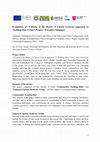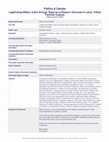Papers by Katerina Krulisova

Tackling Hate Crime' was a two-year pilot project funded by the European Union's Rights, Equality... more Tackling Hate Crime' was a two-year pilot project funded by the European Union's Rights, Equality and Citizenship Programme. In line with Nottingham City's values of 'Nottingham Together' and 'More in Common', the aim of the project was to prevent and tackle hate crime in new and innovative ways, bringing together policing, the criminal justice system, voluntary sector, communities and other statutory services. The project used the five key areas of focus identified in the UK government's action plan for tackling hate crime (2016, 2018): Preventing hate crime; Responding to hate crime in our communities; Increasing the reporting of hate crime; Improving support for the victims of hate crime; Building our understanding of hate crime. Elements of the project The project comprised of two streams of work: "Communities Tackling Hate" and "Enhanced Options Model for victims", with the support of Communication Campaigns. Communities Tackling Hate This element of the project aimed to equip communities and citizens to challenge intolerance and hate, and to produce counter-narratives, functioning to build community resilience and promoting individuals and communities as active agents of change. Activities included "counter-narratives", which were delivered via Community Conversations and Conversations Toolkit. Enhanced Options Model for victims The aim of this model is to reduce the time from reporting to outcome and improve service and options for victims of hate crime. In practice, this means thatdependent on where and how victims report a hate incident and the nature of the incidentthe victim is offered a menu of 'next steps' including the criminal justice route, restorative justice processes, mediation, and
Sexuality, Oppression and Human Rights

Troubling Motherhood
Analyzing the cases of Biljana Plavšić and Pauline Nyiramasuhuko, two prominent female politician... more Analyzing the cases of Biljana Plavšić and Pauline Nyiramasuhuko, two prominent female politicians accused of perpetrating political violence in the former Yugoslavia and Rwanda, respectively, this chapter focuses on the ways violent women represent themselves when accused of crimes against humanity, genocide, and genocidal rape. Employing the concepts of twisted motherhood, maternal love, and monstrous mothering, together with maternal naivety about realities of war-fighting, the work first traces the feminist theorization of politically violent womanhood and motherhood; second, the chapter discusses the conceptualization of female violence in relation to the dominant motherhood narratives; and, finally, it offers an alternative critical reading of mothering as connected representation of oneself when politically violent. Studying representation of the violent self through feminist lenses enable one to critically analyze the importance of motherhood narratives in global politics. B...
Journal of Perpetrator Research
This paper focuses on the legal defence of Biljana Plavšić before the United Nations Internationa... more This paper focuses on the legal defence of Biljana Plavšić before the United Nations International Criminal Tribunal for the Former Yugoslavia. It analyses the discursive strategies chosen by Plavšić in her plea of guilt. Utilising the theoretical concepts of motherhood, ' Beautiful Soul' , double and triple transgressions, and Othering, together with legal and criminological debates on chivalry, Plavšić' s representations of herself and her actions during the war are critically analysed. Studying the case of Plavšić, this article aims to enrich the existing feminist debates on the representation of violent women in the media and in justice tribunals.

African Security Review
ABSTRACT Examining the case of Mali, this work analyses the discursive strategies utilised by key... more ABSTRACT Examining the case of Mali, this work analyses the discursive strategies utilised by key actors to legitimise the UN’s Multidimensional Integrated Stabilisation Mission in Mali (MINUSMA). The analysis traces the legitimisation strategies deployed in both the official and unofficial discourses surrounding the operation. Using van Leeuwen’s conceptualisation of legitimisation, this work uncovers the subtle and not-so-subtle ways the dominant discourse foregrounds certain gendered harms. We argue that the primarily Western conceptualisation of the situation in Mali foregrounds the rape (of young girls) to form the strongest pro-intervention argument. Within this logic, the focus on the bodies of violated women and children aims at providing the undeniable and ultimate proof of barbarity of local rebels. This leads to an immediate need for deployment and continuation of a robust peacekeeping mission.

Politics & Gender
Contemporary discourse on sexual(ized) violence in armed conflicts represents a powerful source f... more Contemporary discourse on sexual(ized) violence in armed conflicts represents a powerful source for legitimization of highly controversial military interventions. Recent gender-responsive security studies have called for enhanced protection of women and girls from widespread and systematic sexual(ized) violence. Yet military operations reproduce the Western masculine hegemony rather than providing inclusive and apolitical assistance to victims of sexual assault. The article aims to critically assess discourse on sexual violence in a case of military intervention in Libya initiated under the rubric of the Responsibility to Protect (R2P). The case study indicates a set of discursive strategies exercised by Western political representatives and nongovernmental organizations and even more expressively by the media to legitimize the military campaign. Typically, sexual(ized) violence is presented as a weapon of war, used by one of the conflicting parties without an adequate response of t...
Czech Journal of International Relations
Thinking on war, violence and security has always been associated with concepts of femininity and... more Thinking on war, violence and security has always been associated with concepts of femininity and masculinity. Similarly, wars and political transformations also change the notions of the roles of women and men in society. This article shows how the links between gender identities and threat construction, understanding of aggression, or social sensitivity to different types of victims of violence can be studied academically. It introduces feminist security studies, embeds it in the research of international relations and security, and encourages its development in the Czech academic environment. The article introduces key concepts and methods of studying gender in (international) security, identifies key themes in feminist security research, and explains various approaches and types of questions that can be investigated in this area.

Troubling Motherhood
Analyzing the cases of Biljana Plavšić and Pauline Nyiramasuhuko, two prominent female politician... more Analyzing the cases of Biljana Plavšić and Pauline Nyiramasuhuko, two prominent female politicians accused of perpetrating political violence in the former Yugoslavia and Rwanda, respectively, this chapter focuses on the ways violent women represent themselves when accused of crimes against humanity, genocide, and genocidal rape. Employing the concepts of twisted motherhood, maternal love, and monstrous mothering, together with maternal naivety about realities of war-fighting, the work first traces the feminist theorization of politically violent womanhood and motherhood; second, the chapter discusses the conceptualization of female violence in relation to the dominant motherhood narratives; and, finally, it offers an alternative critical reading of mothering as connected representation of oneself when politically violent. Studying representation of the violent self through feminist lenses enable one to critically analyze the importance of motherhood narratives in global politics. B...
Czech Journal of International Relations, 2020
Thinking on war, violence and security has always been associated with concepts of femininity and... more Thinking on war, violence and security has always been associated with concepts of femininity and masculinity. Similarly, wars and political transformations also change the notions of the roles of women and men in society. This article shows how the links between gender identities and threat construction, understanding of aggression, or social sensitivity to different types of victims of violence can be studied academically. It introduces feminist security studies, embeds it in the research of international relations and security, and encourages its development in the Czech academic environment. The article introduces key concepts and methods of studying gender in (international) security, identifies key themes in feminist security research, and explains various approaches and types of questions that can be investigated in this area.
Journal of Perpetrator Research, 2020
This paper focuses on the legal defence of Biljana Plavšić before the United Nations Internationa... more This paper focuses on the legal defence of Biljana Plavšić before the United Nations International Criminal Tribunal for the Former Yugoslavia. It analyses the discursive strategies chosen by Plavšić in her plea of guilt. Utilising the theoretical concepts of motherhood, ' Beautiful Soul' , double and triple transgressions, and Othering, together with legal and criminological debates on chivalry, Plavšić' s representations of herself and her actions during the war are critically analysed. Studying the case of Plavšić, this article aims to enrich the existing feminist debates on the representation of violent women in the media and in justice tribunals.
This work examines how the media representation of the female self-martyrs of Dagestan and Chechn... more This work examines how the media representation of the female self-martyrs of Dagestan and Chechnya, often dubbed " Black Widows " , portrays them as irrational, hysterical and/or desperate. The replica-tion of the " Chechen Black Widow " narrative, applied to any female self-martyr striking on Russian soil, is clearly visible in both British and Russian media. This not only denies political agency to female attackers of Dagestani origin, but also attempts to dehumanise and de-monize the entire group. By linking the bombers to unspecified " outside forces " and " Islamist " terrorism, any measures taken to suppress them, however harsh, are then justified to the public.








Uploads
Papers by Katerina Krulisova